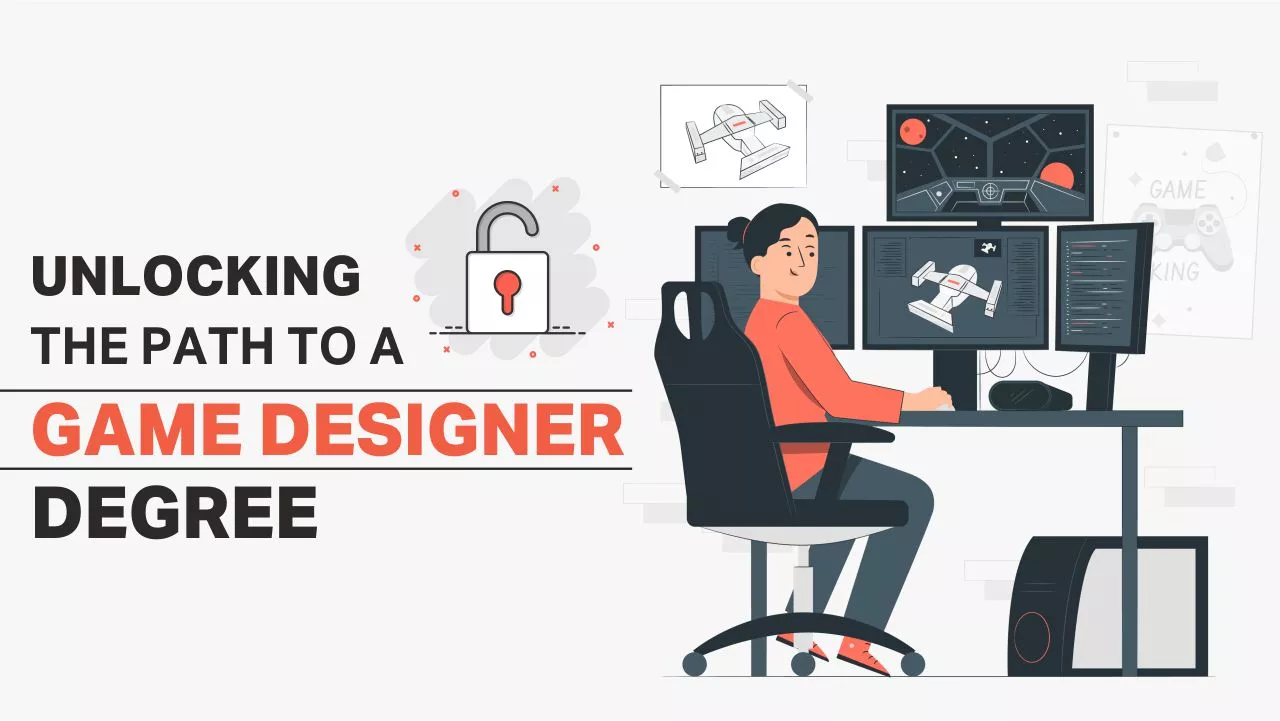
Unlocking the Path to a Game Designer Degree
In today’s digital era, the gaming industry has experienced tremendous growth and offers exciting career opportunities. If you have a passion for creating immersive and captivating video games, pursuing a game designer degree is an excellent choice.
With this blog, we will explore the path to becoming a game designer. Also, explain the qualifications for game designer required and the software available to enhance your skills. Whether you aspire to develop indie games or work with renowned game studios. We also help you embark on a fulfilling journey in game design.
Qualifications for a Game Designer
While there is no set educational pathway to becoming a game designer, certain qualifications can enhance your prospects in this field. Here are some key qualifications and skills sought after by game design employers:
- Bachelor’s Game Designer Degree: Pursuing a bachelor’s game designer degree, in computer science, interactive media, or a related field. It can provide a solid foundation for a career in game design.
These programs typically cover various aspects of game development. Some of them are game mechanics, level design, storytelling, programming, and graphic design. - Strong Design Skills: Game designers should possess strong creative and design skills. They should understand aesthetics, user experience (UX) design, and the ability to create engaging gameplay mechanics.
Developing skills in graphic design, illustration, animation, and user interface (UI) design can be beneficial. - Programming Knowledge: While game designers are not required to be expert programmers, having a basic understanding of programming languages such as C++, C#, or Python can be advantageous. It allows for effective collaboration with programmers and facilitates better communication during the game development process.
- Problem-Solving and Critical Thinking: Game designers need to think analytically, solve problems, and make design decisions. As a result, it enhances the player experience. Developing critical thinking skills and the ability to iterate and refine game concepts are essential for success in this field.
Game Designing Courses
Several courses and programs are available to aspiring game designers, catering to different skill levels and educational backgrounds. Here are some options to consider:
- Bachelor’s Degree Programs: Numerous universities and colleges worldwide offer bachelor’s game designer degrees specifically focused on game design. These programs provide a comprehensive curriculum covering game development principles, design theory, programming, and project management.
Examples include a Bachelor of Science in Game Design, a Bachelor of Arts in Interactive Media, or a Bachelor of Fine Arts in Game Design. - Online Courses and Tutorials: Online learning platforms offer a wide range of game designing courses. These are suitable for beginners and intermediate learners. Platforms such as Udemy, Coursera, and LinkedIn Learning provide courses covering various aspects of the game designing course. These are including game development, level design, character design, and narrative design.
- Specialized Game Design Schools: Some institutions specialize in game design education. It offers intensive programs focused solely on game development. These schools often provide hands-on training, access to industry-standard software, and networking opportunities. Some examples include K.R. Mangalam University, Full Sail University, and Vancouver Film School.
- After 12th Game Designing Courses in India: In India, several institutes and universities offer game design courses after completing 12th grade. Institutions like K.R. Mangalam University, the National Institute of Design (NID), and ICAT Design and Media College offer undergraduate programs in game design and development.
Game Designing Software
To excel in game design, familiarity with industry-standard software and tools is crucial. Here are some popular software and tools used by game designers:
- Game Engines: Game engines are software frameworks that provide the necessary tools and functionality to create and develop games. Unity and Unreal Engine are two widely used game engines.It offers intuitive interfaces, powerful rendering capabilities, and support for multiple platforms.
These engines allow game designers to create interactive environments, design gameplay mechanics, and implement visual effects. - 3D Modeling and Animation: Software such as Autodesk Maya, 3ds Max, and Blender are essential for creating 3D models, characters, and animations. These tools provide a range of features, including modeling, texturing, rigging, and animation. It allows game designers to bring their visions to life.
- Graphic Design and Image Editing: Adobe Photoshop is widely used for creating and editing game assets such as textures, user interface elements, and promotional materials. It offers advanced image editing capabilities, layer management, and a wide array of filters and effects.
- Level Design and World Building: Tools like Unity’s ProBuilder and Unreal Engine’s level editor provide an extra edge to game designers. It helps them with the ability to create intricate game levels, set up environments, and design terrain. These tools often have intuitive interfaces and support features such as lighting, particle effects, and physics simulations.
- Sound Design and Music Composition: Sound effects and music play a crucial role in game immersion. Game designing software like Audacity, Reaper, and FL Studio is commonly used for sound editing, mixing, and music composition. These tools allow game designers to create and integrate high-quality audio assets into their games.
Conclusion
A game designer degree, combined with relevant qualifications and skills, can open doors to a thriving career in the gaming industry. By pursuing a bachelor’s degree in game design or a related field, honing your design skills. By gaining practical experience through courses and software, one can develop a strong foundation for success.
Embrace your creativity, keep up with industry trends, and continually refine your skills to stay at the forefront of game design. With determination and dedication, you can turn your passion for gaming into a fulfilling and rewarding profession.
Recent Post
